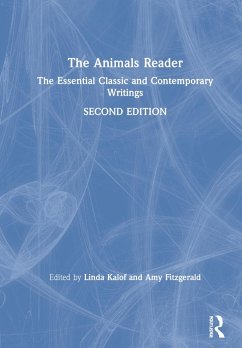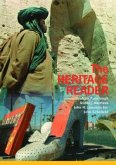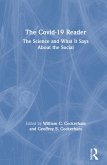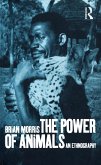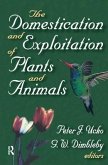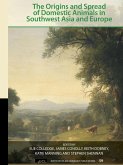The Animals Reader
The Essential Classic and Contemporary Writings
Herausgeber: Kalof, Linda; Fitzgerald, Amy
The Animals Reader
The Essential Classic and Contemporary Writings
Herausgeber: Kalof, Linda; Fitzgerald, Amy
- Gebundenes Buch
- Merkliste
- Auf die Merkliste
- Bewerten Bewerten
- Teilen
- Produkt teilen
- Produkterinnerung
- Produkterinnerung
Contains 42 classic and contemporary writings from philosophy, ethics, sociology, cultural studies, anthropology, history, law and science. Essential reading for anyone interested in human-animal relations.
Andere Kunden interessierten sich auch für
![The Heritage Reader The Heritage Reader]() Graham Fairclough / Rodney Harrison / Jnr. John H. Jameson / John Schofield (eds.)The Heritage Reader82,99 €
Graham Fairclough / Rodney Harrison / Jnr. John H. Jameson / John Schofield (eds.)The Heritage Reader82,99 €![The Richard & Judy Book Club Reader The Richard & Judy Book Club Reader]() Helen CousinsThe Richard & Judy Book Club Reader216,99 €
Helen CousinsThe Richard & Judy Book Club Reader216,99 €![The Covid-19 Reader The Covid-19 Reader]() The Covid-19 Reader249,99 €
The Covid-19 Reader249,99 €![The Richard & Judy Book Club Reader The Richard & Judy Book Club Reader]() Helen CousinsThe Richard & Judy Book Club Reader76,99 €
Helen CousinsThe Richard & Judy Book Club Reader76,99 €![The Power of Animals The Power of Animals]() Brian MorrisThe Power of Animals59,99 €
Brian MorrisThe Power of Animals59,99 €![The Domestication and Exploitation of Plants and Animals The Domestication and Exploitation of Plants and Animals]() G. W. DimblebyThe Domestication and Exploitation of Plants and Animals229,99 €
G. W. DimblebyThe Domestication and Exploitation of Plants and Animals229,99 €![The Origins and Spread of Domestic Animals in Southwest Asia and Europe The Origins and Spread of Domestic Animals in Southwest Asia and Europe]() The Origins and Spread of Domestic Animals in Southwest Asia and Europe57,99 €
The Origins and Spread of Domestic Animals in Southwest Asia and Europe57,99 €-
-
-
Contains 42 classic and contemporary writings from philosophy, ethics, sociology, cultural studies, anthropology, history, law and science. Essential reading for anyone interested in human-animal relations.
Hinweis: Dieser Artikel kann nur an eine deutsche Lieferadresse ausgeliefert werden.
Hinweis: Dieser Artikel kann nur an eine deutsche Lieferadresse ausgeliefert werden.
Produktdetails
- Produktdetails
- Verlag: Routledge
- 2. Auflage
- Seitenzahl: 586
- Erscheinungstermin: 14. September 2021
- Englisch
- Abmessung: 260mm x 183mm x 36mm
- Gewicht: 1282g
- ISBN-13: 9781350066878
- ISBN-10: 1350066877
- Artikelnr.: 58261298
- Herstellerkennzeichnung
- Libri GmbH
- Europaallee 1
- 36244 Bad Hersfeld
- gpsr@libri.de
- Verlag: Routledge
- 2. Auflage
- Seitenzahl: 586
- Erscheinungstermin: 14. September 2021
- Englisch
- Abmessung: 260mm x 183mm x 36mm
- Gewicht: 1282g
- ISBN-13: 9781350066878
- ISBN-10: 1350066877
- Artikelnr.: 58261298
- Herstellerkennzeichnung
- Libri GmbH
- Europaallee 1
- 36244 Bad Hersfeld
- gpsr@libri.de
Linda Kalof is Professor of Sociology and Founding Director of the graduate certification in Animal Studies at Michigan State University, USA. Her research focuses on the cultural history of animal iconography. She has published twelve books and edits The Animal Turn book series at MSU Press. Amy Fitzgerald is Professor of Criminology in the Department of Sociology, Anthropology and Criminology at the Great Lakes Institute for Environmental Research at the University of Windsor, Canada. She has authored several articles and books examining the intersection of harms perpetrated against people, animals and the environment.
Prologue: reflections on the animal photographs Britta Jaschinski Editorial
introduction Linda Kalof and Amy Fitzgerald Part 1: Animals as
philosophical, ethical and political subjects Introduction 1. The history
of animals Aristotle 2. Principles of morals and legislation Jeremy Bentham
3. Equality for animals? Peter Singer 4. In defense of slavery Marjorie
Spiegel 5. The nature and importance of rights Tom Regan 6. Animal thing to
animal person - thoughts on time, place, and theories Steven Wise 7.
Frontiers of justice: capabilities and animals Martha Nussbaum 8.
Becoming-animal Gilles Deleuze and Félix Guattari 9. The animal that
therefore I am (more to follow) Jacques Derrida 10. From polis to zoopolis:
a political theory of animal rights Sue Donaldson and Will Kymlicka 11. The
struggle for compassion and justice through critical animal studies Carol
Gigliotti Further reading in aminals as philosophical, ethical and
political subjects Part 2: Animals as reflexive thinkers Introduction 12.
An apology for Raymond Sebond Michel de Montaigne 13. From the letters of
1646 and 1649 René Descartes 14. The emotions Charles Darwin 15. Speaking
for dogs Arnold Arluke and Clinton R. Sanders 16. Wild justice and fair
play: cooperation, forgiveness, and morality in animals Marc Bekoff 17.
Grief, sadness, and the bones of elephants Jeffrey Moussaieff Masson and
Susan McCarthy 18. Orangutan cultures and the evolution of material culture
Carel P. van Schaik, Marc Ancrenaz, Gwendolyn Borgen, Birute Galdikas,
Cheryl D. Knott, Ian Singleton, Akira Suzuki, Sri Suci Utami, and Michelle
Merrill Further reading in animals as reflexive thinkers Part 3: Animals as
domesticates, companions and food Introduction 19. The hunter-gatherer
prehistory of human-animal interactions Steven Mithen 20. Animal pets:
cruelty and affection Yi-Fu Tuan 21. The eating of flesh Plutarch 22. Brave
new farm? Jim Mason and Mary Finelli 23. The sexual politics of meat Carol
J. Adams 24. Nomadic pastoralism, ranching, and violence David Nibert 25.
Theriocide: naming animal killing Piers Beirne 26. The work of animals: a
challenge for social sciences Jocelyne Porcher Further reading in animals
as domesticates, companions and food Part 4: Animals as spectacle and sport
Introduction 27. Combats of elephants Pliny the Elder 28. On being human in
the bullfight Garry Marvin 29. Dogfighting: symbolic expression and
validation of masculinity Rhonda Evans, DeAnn Kalich (Gauthier) and Craig
J. Forsyth 30. Hunting and humanity in Western thought Matt Cartmill 31.
Naturalizing zoo animals Irus Braverman Further reading in animals as
spectacle and sport Part 5: Animals as symbols Introduction 32. Why look at
animals? John Berger 33. The totemic illusion Claude Lévi-Strauss 34.
Animals as tradition Boria Sax 35. Animals and visual culture Randy Malamud
36. What is the postmodern animal? Steve Baker Further reading in animals
as symbols Part 6: Animals as scientific objects Introduction 37.
Observations on the animal kingdom Carl Linnaeus 38. The Brown Dog Riots of
1907 Coral Lansbury 39. Into the laboratory Lynda Birke 40. Biopower and
the biotechnological framing of the animal body Richard Twine 41. Sharing
suffering: instrumental relations between laboratory animals and their
people Donna J. Haraway 42. Responding bodies and partial affinities in
human-animal worlds Vinciane Despret Further reading in animals as
scientific objects. Index
introduction Linda Kalof and Amy Fitzgerald Part 1: Animals as
philosophical, ethical and political subjects Introduction 1. The history
of animals Aristotle 2. Principles of morals and legislation Jeremy Bentham
3. Equality for animals? Peter Singer 4. In defense of slavery Marjorie
Spiegel 5. The nature and importance of rights Tom Regan 6. Animal thing to
animal person - thoughts on time, place, and theories Steven Wise 7.
Frontiers of justice: capabilities and animals Martha Nussbaum 8.
Becoming-animal Gilles Deleuze and Félix Guattari 9. The animal that
therefore I am (more to follow) Jacques Derrida 10. From polis to zoopolis:
a political theory of animal rights Sue Donaldson and Will Kymlicka 11. The
struggle for compassion and justice through critical animal studies Carol
Gigliotti Further reading in aminals as philosophical, ethical and
political subjects Part 2: Animals as reflexive thinkers Introduction 12.
An apology for Raymond Sebond Michel de Montaigne 13. From the letters of
1646 and 1649 René Descartes 14. The emotions Charles Darwin 15. Speaking
for dogs Arnold Arluke and Clinton R. Sanders 16. Wild justice and fair
play: cooperation, forgiveness, and morality in animals Marc Bekoff 17.
Grief, sadness, and the bones of elephants Jeffrey Moussaieff Masson and
Susan McCarthy 18. Orangutan cultures and the evolution of material culture
Carel P. van Schaik, Marc Ancrenaz, Gwendolyn Borgen, Birute Galdikas,
Cheryl D. Knott, Ian Singleton, Akira Suzuki, Sri Suci Utami, and Michelle
Merrill Further reading in animals as reflexive thinkers Part 3: Animals as
domesticates, companions and food Introduction 19. The hunter-gatherer
prehistory of human-animal interactions Steven Mithen 20. Animal pets:
cruelty and affection Yi-Fu Tuan 21. The eating of flesh Plutarch 22. Brave
new farm? Jim Mason and Mary Finelli 23. The sexual politics of meat Carol
J. Adams 24. Nomadic pastoralism, ranching, and violence David Nibert 25.
Theriocide: naming animal killing Piers Beirne 26. The work of animals: a
challenge for social sciences Jocelyne Porcher Further reading in animals
as domesticates, companions and food Part 4: Animals as spectacle and sport
Introduction 27. Combats of elephants Pliny the Elder 28. On being human in
the bullfight Garry Marvin 29. Dogfighting: symbolic expression and
validation of masculinity Rhonda Evans, DeAnn Kalich (Gauthier) and Craig
J. Forsyth 30. Hunting and humanity in Western thought Matt Cartmill 31.
Naturalizing zoo animals Irus Braverman Further reading in animals as
spectacle and sport Part 5: Animals as symbols Introduction 32. Why look at
animals? John Berger 33. The totemic illusion Claude Lévi-Strauss 34.
Animals as tradition Boria Sax 35. Animals and visual culture Randy Malamud
36. What is the postmodern animal? Steve Baker Further reading in animals
as symbols Part 6: Animals as scientific objects Introduction 37.
Observations on the animal kingdom Carl Linnaeus 38. The Brown Dog Riots of
1907 Coral Lansbury 39. Into the laboratory Lynda Birke 40. Biopower and
the biotechnological framing of the animal body Richard Twine 41. Sharing
suffering: instrumental relations between laboratory animals and their
people Donna J. Haraway 42. Responding bodies and partial affinities in
human-animal worlds Vinciane Despret Further reading in animals as
scientific objects. Index
Prologue: reflections on the animal photographs Britta Jaschinski Editorial
introduction Linda Kalof and Amy Fitzgerald Part 1: Animals as
philosophical, ethical and political subjects Introduction 1. The history
of animals Aristotle 2. Principles of morals and legislation Jeremy Bentham
3. Equality for animals? Peter Singer 4. In defense of slavery Marjorie
Spiegel 5. The nature and importance of rights Tom Regan 6. Animal thing to
animal person - thoughts on time, place, and theories Steven Wise 7.
Frontiers of justice: capabilities and animals Martha Nussbaum 8.
Becoming-animal Gilles Deleuze and Félix Guattari 9. The animal that
therefore I am (more to follow) Jacques Derrida 10. From polis to zoopolis:
a political theory of animal rights Sue Donaldson and Will Kymlicka 11. The
struggle for compassion and justice through critical animal studies Carol
Gigliotti Further reading in aminals as philosophical, ethical and
political subjects Part 2: Animals as reflexive thinkers Introduction 12.
An apology for Raymond Sebond Michel de Montaigne 13. From the letters of
1646 and 1649 René Descartes 14. The emotions Charles Darwin 15. Speaking
for dogs Arnold Arluke and Clinton R. Sanders 16. Wild justice and fair
play: cooperation, forgiveness, and morality in animals Marc Bekoff 17.
Grief, sadness, and the bones of elephants Jeffrey Moussaieff Masson and
Susan McCarthy 18. Orangutan cultures and the evolution of material culture
Carel P. van Schaik, Marc Ancrenaz, Gwendolyn Borgen, Birute Galdikas,
Cheryl D. Knott, Ian Singleton, Akira Suzuki, Sri Suci Utami, and Michelle
Merrill Further reading in animals as reflexive thinkers Part 3: Animals as
domesticates, companions and food Introduction 19. The hunter-gatherer
prehistory of human-animal interactions Steven Mithen 20. Animal pets:
cruelty and affection Yi-Fu Tuan 21. The eating of flesh Plutarch 22. Brave
new farm? Jim Mason and Mary Finelli 23. The sexual politics of meat Carol
J. Adams 24. Nomadic pastoralism, ranching, and violence David Nibert 25.
Theriocide: naming animal killing Piers Beirne 26. The work of animals: a
challenge for social sciences Jocelyne Porcher Further reading in animals
as domesticates, companions and food Part 4: Animals as spectacle and sport
Introduction 27. Combats of elephants Pliny the Elder 28. On being human in
the bullfight Garry Marvin 29. Dogfighting: symbolic expression and
validation of masculinity Rhonda Evans, DeAnn Kalich (Gauthier) and Craig
J. Forsyth 30. Hunting and humanity in Western thought Matt Cartmill 31.
Naturalizing zoo animals Irus Braverman Further reading in animals as
spectacle and sport Part 5: Animals as symbols Introduction 32. Why look at
animals? John Berger 33. The totemic illusion Claude Lévi-Strauss 34.
Animals as tradition Boria Sax 35. Animals and visual culture Randy Malamud
36. What is the postmodern animal? Steve Baker Further reading in animals
as symbols Part 6: Animals as scientific objects Introduction 37.
Observations on the animal kingdom Carl Linnaeus 38. The Brown Dog Riots of
1907 Coral Lansbury 39. Into the laboratory Lynda Birke 40. Biopower and
the biotechnological framing of the animal body Richard Twine 41. Sharing
suffering: instrumental relations between laboratory animals and their
people Donna J. Haraway 42. Responding bodies and partial affinities in
human-animal worlds Vinciane Despret Further reading in animals as
scientific objects. Index
introduction Linda Kalof and Amy Fitzgerald Part 1: Animals as
philosophical, ethical and political subjects Introduction 1. The history
of animals Aristotle 2. Principles of morals and legislation Jeremy Bentham
3. Equality for animals? Peter Singer 4. In defense of slavery Marjorie
Spiegel 5. The nature and importance of rights Tom Regan 6. Animal thing to
animal person - thoughts on time, place, and theories Steven Wise 7.
Frontiers of justice: capabilities and animals Martha Nussbaum 8.
Becoming-animal Gilles Deleuze and Félix Guattari 9. The animal that
therefore I am (more to follow) Jacques Derrida 10. From polis to zoopolis:
a political theory of animal rights Sue Donaldson and Will Kymlicka 11. The
struggle for compassion and justice through critical animal studies Carol
Gigliotti Further reading in aminals as philosophical, ethical and
political subjects Part 2: Animals as reflexive thinkers Introduction 12.
An apology for Raymond Sebond Michel de Montaigne 13. From the letters of
1646 and 1649 René Descartes 14. The emotions Charles Darwin 15. Speaking
for dogs Arnold Arluke and Clinton R. Sanders 16. Wild justice and fair
play: cooperation, forgiveness, and morality in animals Marc Bekoff 17.
Grief, sadness, and the bones of elephants Jeffrey Moussaieff Masson and
Susan McCarthy 18. Orangutan cultures and the evolution of material culture
Carel P. van Schaik, Marc Ancrenaz, Gwendolyn Borgen, Birute Galdikas,
Cheryl D. Knott, Ian Singleton, Akira Suzuki, Sri Suci Utami, and Michelle
Merrill Further reading in animals as reflexive thinkers Part 3: Animals as
domesticates, companions and food Introduction 19. The hunter-gatherer
prehistory of human-animal interactions Steven Mithen 20. Animal pets:
cruelty and affection Yi-Fu Tuan 21. The eating of flesh Plutarch 22. Brave
new farm? Jim Mason and Mary Finelli 23. The sexual politics of meat Carol
J. Adams 24. Nomadic pastoralism, ranching, and violence David Nibert 25.
Theriocide: naming animal killing Piers Beirne 26. The work of animals: a
challenge for social sciences Jocelyne Porcher Further reading in animals
as domesticates, companions and food Part 4: Animals as spectacle and sport
Introduction 27. Combats of elephants Pliny the Elder 28. On being human in
the bullfight Garry Marvin 29. Dogfighting: symbolic expression and
validation of masculinity Rhonda Evans, DeAnn Kalich (Gauthier) and Craig
J. Forsyth 30. Hunting and humanity in Western thought Matt Cartmill 31.
Naturalizing zoo animals Irus Braverman Further reading in animals as
spectacle and sport Part 5: Animals as symbols Introduction 32. Why look at
animals? John Berger 33. The totemic illusion Claude Lévi-Strauss 34.
Animals as tradition Boria Sax 35. Animals and visual culture Randy Malamud
36. What is the postmodern animal? Steve Baker Further reading in animals
as symbols Part 6: Animals as scientific objects Introduction 37.
Observations on the animal kingdom Carl Linnaeus 38. The Brown Dog Riots of
1907 Coral Lansbury 39. Into the laboratory Lynda Birke 40. Biopower and
the biotechnological framing of the animal body Richard Twine 41. Sharing
suffering: instrumental relations between laboratory animals and their
people Donna J. Haraway 42. Responding bodies and partial affinities in
human-animal worlds Vinciane Despret Further reading in animals as
scientific objects. Index

